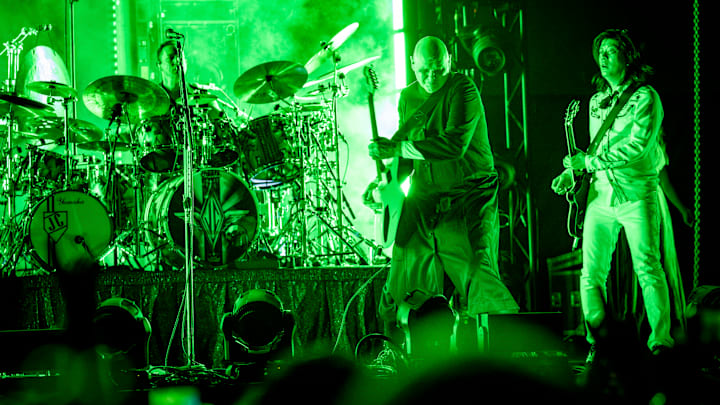As Loudwire notes: "Billy Corgan refuses to be pressured into playing the Smashing Pumpkins' classic hits." The frontman recently spoke with Kerrang, rejecting the notion that his band must perform their famous songs to satisfy fans. Why might he feel that way?
Though that might not sit right with everyone, sometimes that is an aspect of an artist's creative control, or perhaps they just don't want to be pushovers. For example, Andy Biersack of Black Veil Brides noted recently: "We've been in great situations with labels, but I would be lying if I didn't say that songs got remixed, ideas got thrown out and things beyond my control happened when I was younger. And that was extremely frustrating. At this point, our fans have supported us for so long that we’re able to do exactly what we want without people saying, ‘What if we did this instead?’ to the point where we’re getting away from the original idea."
Sometimes, when it comes to creative control, if you give others an inch, they'll take a mile. On that note: "I don't play any songs I don't want to play. I don't care if they're a classic or not" says Corgan. "If I don't want to play it, I just don't play it. I don't put that on the audience like, ‘Well, I've got to play this one for you.’ I think that's kind of cheese."
Smashing Pumpkins, formed in 1988, became one of the most commercially successful and critically acclaimed bands of the 1990s. They are known for hits like "1979," "Tonight, Tonight," and "Bullet with Butterfly Wings."
Billy Corgan wants to find balance between the old and the new
Despite their early success, Corgan has always emphasized artistic integrity over commercial appeal. During the conversation, Corgan explained his resistance to nostalgia. "It's hard to explain unless you've lived it," he said.
"Because there’s the classic thing where there's a devil on one shoulder and an angel on the other, and the devil goes, ‘Hey, man, if you just write in these extra five songs that people want to hear, you're going to have a really easy night, and no-one's going to be mad at you.’ But that's not why you're up there. And you have to remember that there's this other part of the audience that wants to see you today."
It's not about warrning with fans...
Corgan acknowledged that it’s not a bad thing for fans to want to hear songs they love, but he cautioned that bands "can't live in the past. It's the death of any artist."
He further asserted that fans “don’t want some aging relic,” which is why he believes new music is important. He explained that the key lies in balancing old and new material, a concept that took him many years to understand.
"It takes a hot second to understand the difference between, ‘Hey, I really love what you do. I'm here out of respect, I've paid my money, I've gotten my babysitter. And I'm looking for something, can you give it to me? Because I really love that music, and I love that period of my life,’ and then an artist feeling like they have to serve something that they don't want to serve,"
"Like they're chained to a past or a legacy. By putting myself in the audience and trying to understand what I would want to see from a band from the audience’s perspective, that allowed me to soften up and realize that maybe my position was a little too… arty.”
That being said, some artists make bold decisions, such as Serj Tankian of System of a Down cutting down on touring significantly. Then you have Trent Reznor frequently criticizing the business side of the music business, sometimes to the delight of the audience. It's often interesting to see where people will draw the line, and where they will compromise, and part of how music history happens before our eyes and ears.
